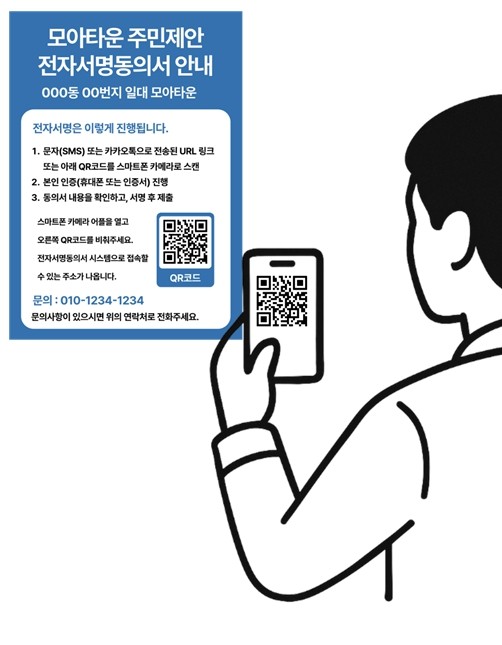Seoul has established the nation’s first “Moa Town Resident Proposal Electronic Signature Operation Guidelines” to simplify the resident proposal procedure of the Moa Town project and enhance transparency in participation. This is a follow-up measure to the “Introduction of Electronic Signatures” announcement last May, serving as practical guidelines to ensure both accessibility for residents and efficiency in business promotion.
Moa Town is an urban regeneration-type housing supply model driven by resident proposals, aimed at improving the residential environment of low-rise housing areas. While the existing paper-based resident consent procedures have been consistently criticized as inefficient and non-standard, the introduction of electronic signatures by Seoul forecasts a significant shift in participation methods.
The current guidelines clarify the legal validity of electronic signatures and delineate the roles of residents, local districts, and the implementation body to minimize confusion on-site. They also detail the technical requirements of service providers, electronic document storage methods, and verification procedures.
The electronic signature process begins once the implementing body completes system construction and selects a service provider, after which they register the project area information. Residents will then access consent forms and submit electronic signatures after identity verification via SMS or QR codes. This process ensures transparency and security by utilizing real-time consent rate aggregation and automatic encryption.

Seoul has also strengthened security measures for personal information protection. Stored information is encrypted, access rights are separated, and unauthorized access prevention mechanisms are in place. Additionally, subscribing to personal information protection liability insurance is mandated to prepare for accidents during the electronic signing process.
The electronic signature method is optional, and the existing paper consent method will be maintained for elderly or vulnerable groups unfamiliar with digital devices. This aims to complement the limitations of digital accessibility and induce participation from all age groups.
The guidelines are available in the housing sector corner of the Seoul City website under the ‘Moa Housing Moa Town’ section and will also be distributed in paper booklet form.
Choi Jin-seok, head of the Seoul Housing Policy Office, stated, “The introduction of electronic signatures is a measure to make the Moa Town resident proposal participation process more transparent and convenient,” and added, “We will continue to improve the system to establish a resident-centered business participation environment in the future.”